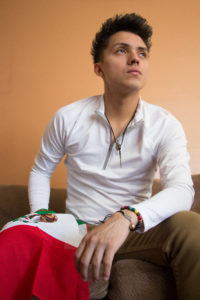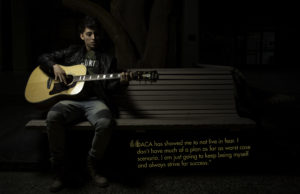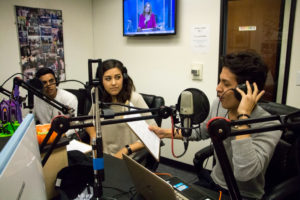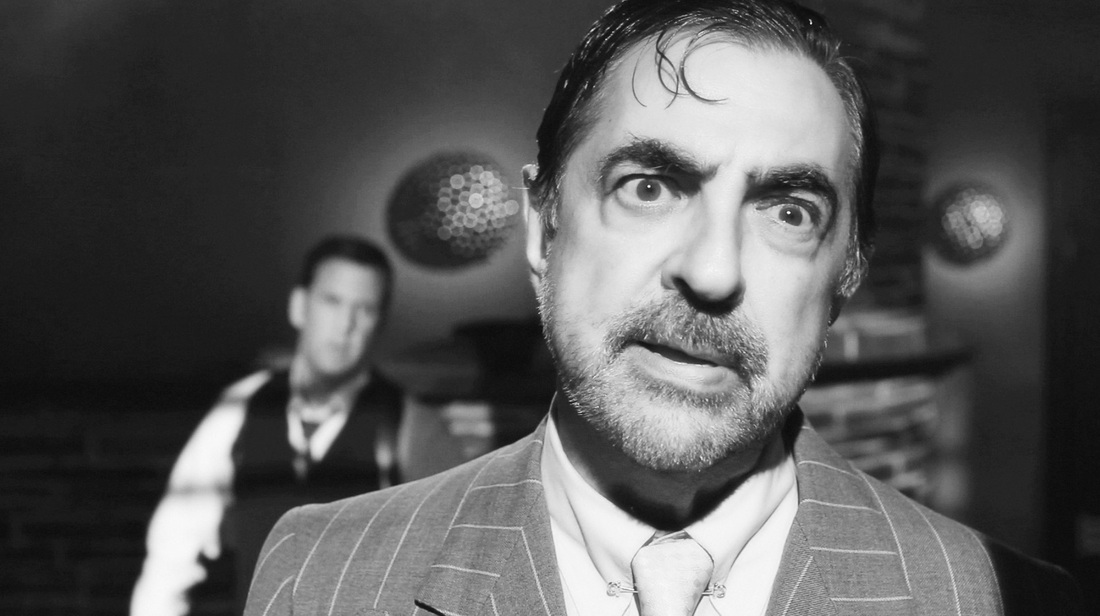Walk the Line: Luis Cordova is a musician, actor, entertainer and a DACA recipient
When Cordova was 9, he competed in an event in Los Angeles sponsored by the International Modeling & Talent Association. He did so well that agents and managers were clamoring for him to audition for film and television. At that point, his family relocated from Tucson, Arizona, to Baldwin Park to get closer to the entertainment industry.
But then he ran into an obstacle. Since he did not have a Social Security number. He was not allowed to work. His parents had told him when he was 6 that he was undocumented.
“It was like I hit a wall,” Cordova said. Empathizing with his parents, he reflected, “How do you tell your 9 year-old kid that [he] can’t do anything.”
Cordova is just one of the hundreds of thousands of students who are a part of the Deferred Action for Childhood Arrivals.
Today nearly 800,000 recipients of Deferred Action for Childhood Arrivals are caught in this gray zone. The DACA program was created in 2012 through executive order by former President Barack Obama. It protects children who may have been brought into the country illegally or who overstayed their visas from the fear of deportation. It allows them to work legally In the United States.

Photo by: Darius Johari
Luis Cordova, 20, business major, poses for a portrait in San Dimas.
Through the DACA program, many undocumented youth have been able to step out of the shadows. DACA recipients are granted work authorization, driver’s licenses and the opportunity to contribute to American society. Many recipients have gone on to be successful business owners, lawyers, doctors and teachers.
The Obama-era program is now under fire. President Donald Trump has opted to not extend the program. Instead he has called upon Congress to revise the immigration policy by March 18, 2018. Attorney General Jeff Sessions told lawmakers that the future of the Deferred Action for Childhood Arrivals program is in their hands.
Ending the program will affect not only families, but communities and businesses. It is estimated that ending DACA would result in a loss of $460.3 billion from the national gross domestic product (GDP) over the next decade. An estimated $11.6 billion could be lost in California alone, according to a data study from the Center for American Progress, a progressive public policy research and advocacy organization.
Luis is just one of the 800,000 DACA students faced with uncertainty and possible deportation.
Luis was born in Culiacan, Sinaloa, northern Mexico and lived there until the age of 4.
In the summer of 2001, Luis’s mother, Fidelia Jacobo, and father, Gustavo Cordova, immigrated legally to the United States on a work visa along with Luis and their oldest son Gustavo. Luis’s father worked for AAA Landscape in Tucson, Arizona and his mother worked in a nursing home.
The two boys enrolled in school.
Luis’s first public performance was in his elementary school talent show. He was 5 years old. With the help of two girl backup dancers, the spirited kindergartener sang and danced to the Beatles’ classic “I Want to Hold Your Hand.”
Fidelia Jacobo, Luis’s mother, remembers the moment. Her son danced around on the stage, holding the first girl’s hand, then he would move to the other as the crowd clapped and cheered.
“When he came to performing, I never really saw him show any sign of nervousness,” Jacobo said. “Gustavo and I saw his excitement after his performance and so we decided to enroll him in voice lessons, modeling, dance lessons and acting.”
The family moved again from Baldwin Park to Pomona while he enrolled in Lone Hill Middle School in San Dimas. After school, Luis took vocal and acting lessons from his mentor Shaun Royer.
Royer has been working as a talent coach in the industry for over 20 years. He has worked with major talents like Christina Aguilera, Justin Timberlake and Alicia Keys. Royer recalled working with Luis in his early years as an entertainer. He described Luis as very polite, quick learner with a great work ethic.
“I don’t remember what I initially thought about his talents but I do remember that he had tremendous support from his family,” Royer said. “There are thousands of talented kids out there that have no outlet because their family members don’t encourage it and are not willing to do what it takes hone the performer’s skills.”
Finally when he was in the sixth grade, Luis got a break. He was recommended to Alvarado Rey’s agency which would work with him despite his undocumented status. He was booked for three TV commercials. In his first gig he appeared in a commercial promoting foster care. His next commercial was Nickelodeon’s “The Big Help,” which was in produced collaboration with Michelle Obama’s “Let’s Move” campaign. His third commercial was for a Universal Studios promotion.
Now he had his agent, but he still couldn’t work legally for pay; so he worked for the experience. His agent had told his family that when Luis finally would have the opportunity to get his papers, he would have a well-established resume.
Luis was 15 when Obama issued his executive order to protect undocumented young people. Under DACA he was legally able to work for pay. The DACA program gave him and his brother Gustavo, who was 18 at the time, hope for the future.
Luis was finally able to live a “normal” life.
He could get a social security number, work, get a driver’s license and continue onto college.
“The biggest thing for me was that now I was able to hit up every single agency that told me to ‘come back when you are ready,’” Luis said.
He was now able to start contacting agents and managers so he could book TV shows. He felt like his career would take off from here.

During his freshmen year at San Dimas High School, Luis was booking commercials and trying to get roles in television. Meanwhile he was singing and dancing at various events. He was invited to be on Estrella TV’s a competition talent show called “Tengo Talento, Mucho Talento.” Estrella TV is an American Spanish-language broadcast television network based in Burbank. Luis described the show as a Latin equivalent to “America’s Got Talent.”
He had been on the show when he was in the seventh grade but did not get past the audition. A talent scout called his father, looking to see if Luis interested in coming back onto the show. That season, he made it to the semifinals before he was eliminated.
He continued performing during his sophomore year at shows like the LA County Fair and landed a part on a pilot TV show. His junior year, Luis chose to be home schooled so he could focus on pursuing his career. He interned with Shaun Royer Artist Development and began to learn the business side of the entertainment industry.
The summer before his senior year he embarked on a three week national tour called “The Official Stand-Up Tour,” but left early to return for school.
Luis wanted to go back to San Dimas High School for his senior year. He had still continued polishing his resume and performing at shows but he needed a break from the limelight. He missed hanging out, writing original music and collaborating with his friends. One of his most memorable moments was performing their original song “Losing My Mind” which they performed at the spring choir “Pop Show.”

Photo by: Darius Johari
Luis Cordova and his co-hosts talking about getting ready for Halloween on their radio segment called the “Hollywood Young Hour” on Estereo Centro 88.7FM.
When it came down to picking out colleges, the 20-year-old business major chose to follow his brother Gustavo’s lead and enrolled at Citrus College.
Gustavo, who had enrolled at Citrus as a recording technology major shoots Luis’s music videos. While Luis was into music and performing, his brother was into the behind-the-scenes film and video recording production.
Since then Luis has landed co-star roles on TV shows like ABC’s “American Housewife,” HBO’s “Insecure,” and The CW’s “Jane the Virgin.” His music videos are on YouTube. He teaches voice lessons and works as an acting coach. He is currently working with his uncle on a radio segment called the “Hollywood Young Hour” on Estereo Centro 88.7FM. He plans to continue working in entertainment.
Meanwhile Congress has until March 18 before DACA expires. Luis is unsure of his future as are the other 800,000 DACA recipients. What they are sure of is that they will continue to pursue their dreams.
“DACA has showed me to not live in fear,” Luis said. “I don’t have much of a plan as far as worst case scenario. I am just going to keep being myself and always strive for success.”



